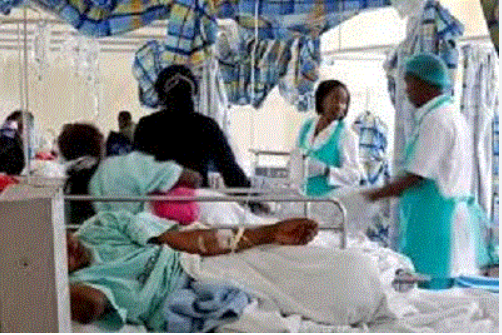By Joke Kujenya
ISSUING AN alarming warning about a cholera outbreak, describing the identified strain as “highly aggressive and contagious, with potential for widespread dissemination.”
This update was provided by the state’s Commissioner for Health, Prof. Akin Abayomi, via his Instagram page, @profakinabayomi, on Monday.
He notes that Cholera, a highly contagious disease causing severe diarrhea in both children and adults, can lead to death within hours if untreated, adding that out of 350 suspected cases, there are 17 confirmed cases and 15 deaths.
“350 suspected cases of cholera were reported in 29 wards across multiple LGAs in Lagos State, with 17 confirmed cases and 15 fatalities attributed to severe dehydration caused by delayed presentation,” he wrote.
The Commissioner added that the state is receiving support from the Nigeria Centre for Disease Control (NCDC) and international partners like the World Health Organization (WHO) and UNICEF. Local NGOs are also actively involved in raising awareness and conducting community-based surveillance.
Suspected cases are being treated free of charge at public health facilities, in line with established public health response protocols.

Similarly, the United Nations Children’s Fund (UNICEF), indicated that recurrent cholera outbreaks in Nigeria are critically affecting children, especially those under five, who face significant health risks, including severe dehydration and higher mortality rates.
Celine Lafoucrier, Chief of Lagos UNICEF Field Office, emphasized the need for state policies to focus on providing high-standard water and sanitation facilities, as well as strengthening healthcare systems to respond effectively during outbreaks.
“Addressing the challenges of cholera outbreaks requires a deliberate focus of state policies. This includes the provision of high-standard water and sanitation facilities and strengthened healthcare systems capable of responding to demand in times of outbreaks. There should be campaigns on cholera prevention to protect children and the population at large,” Lafoucrier stated.
The NCDC, in its advisory, urged Nigerians to mitigate the risk of cholera by boiling water before drinking, storing it in clean and covered containers, practicing good personal hygiene by washing hands frequently with soap under clean running water, ensuring food is well cooked before consumption, avoiding open defecation, indiscriminate refuse dumping, and ensuring proper waste disposal and frequent sewage clearing.
Prof. Abayomi confirmed that laboratory tests have identified the disease outbreak as cholera, noting that the strain is highly aggressive and contagious, with the potential for widespread dissemination. He reported that community-based case finding and contact tracing efforts have peaked, and the number of cases is now declining.
“The geographical distribution of suspected cases by Local Government Area showed that Lagos Island is the epicenter of the outbreak with 106 cases, followed by Kosofe with 49; Eti-Osa with 38; Lagos Mainland with 30; Ojo with 17; Ikorodu with 16; Shomolu with 11; Surulere with nine; Apapa with eight; Mushin with eight; Ifako Ijaiye with eight; Alimosho with four; Ajeromi-Ifelodun with four; Oshodi-Isolo with three; Ikeja with three; Ibeju Lekki with two; Badagry with two; and Amuwo-Odofin with one,” he detailed.
Abayomi reiterated that, “350 suspected cases of cholera were reported in 29 wards across multiple LGAs in Lagos State, with 17 confirmed cases and 15 fatalities attributed to severe dehydration caused by delayed presentation.”





